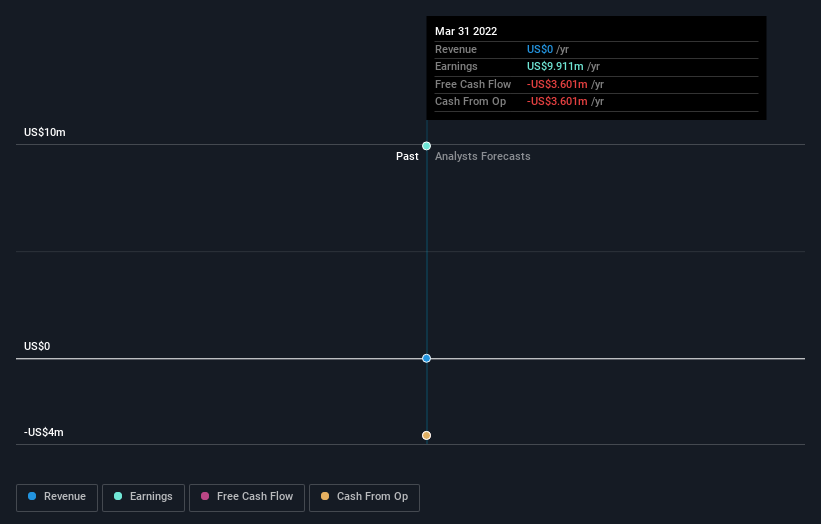What Kind Of Shareholders Hold The Majority In Decarbonization Plus Acquisition Corporation IV's (NASDAQ:DCRD) Shares?
If you want to know who really controls Decarbonization Plus Acquisition Corporation IV (NASDAQ:DCRD), then you'll have to look at the makeup of its share registry. Large companies usually have institutions as shareholders, and we usually see insiders owning shares in smaller companies. Companies that have been privatized tend to have low insider ownership.
Decarbonization Plus Acquisition Corporation IV is a smaller company with a market capitalization of US$392m, so it may still be flying under the radar of many institutional investors. In the chart below, we can see that institutions own shares in the company. We can zoom in on the different ownership groups, to learn more about Decarbonization Plus Acquisition Corporation IV.
View our latest analysis for Decarbonization Plus Acquisition Corporation IV
What Does The Institutional Ownership Tell Us About Decarbonization Plus Acquisition Corporation IV?
Institutional investors commonly compare their own returns to the returns of a commonly followed index. So they generally do consider buying larger companies that are included in the relevant benchmark index.
Decarbonization Plus Acquisition Corporation IV already has institutions on the share registry. Indeed, they own a respectable stake in the company. This suggests some credibility amongst professional investors. But we can't rely on that fact alone since institutions make bad investments sometimes, just like everyone does. When multiple institutions own a stock, there's always a risk that they are in a 'crowded trade'. When such a trade goes wrong, multiple parties may compete to sell stock fast. This risk is higher in a company without a history of growth. You can see Decarbonization Plus Acquisition Corporation IV's historic earnings and revenue below, but keep in mind there's always more to the story.
Since institutional investors own more than half the issued stock, the board will likely have to pay attention to their preferences. We note that hedge funds don't have a meaningful investment in Decarbonization Plus Acquisition Corporation IV. The company's largest shareholder is Decarbonization Plus Acquisition Sponsor IV LLC, with ownership of 19%. Meanwhile, the second and third largest shareholders, hold 5.1% and 4.6%, of the shares outstanding, respectively.
After doing some more digging, we found that the top 11 have the combined ownership of 52% in the company, suggesting that no single shareholder has significant control over the company.
While studying institutional ownership for a company can add value to your research, it is also a good practice to research analyst recommendations to get a deeper understand of a stock's expected performance. As far as we can tell there isn't analyst coverage of the company, so it is probably flying under the radar.
Insider Ownership Of Decarbonization Plus Acquisition Corporation IV
The definition of company insiders can be subjective and does vary between jurisdictions. Our data reflects individual insiders, capturing board members at the very least. The company management answer to the board and the latter should represent the interests of shareholders. Notably, sometimes top-level managers are on the board themselves.
I generally consider insider ownership to be a good thing. However, on some occasions it makes it more difficult for other shareholders to hold the board accountable for decisions.
Our data suggests that insiders own under 1% of Decarbonization Plus Acquisition Corporation IV in their own names. We do note, however, it is possible insiders have an indirect interest through a private company or other corporate structure. It appears that the board holds about US$2.1m worth of stock. This compares to a market capitalization of US$392m. We generally like to see a board more invested. However it might be worth checking if those insiders have been buying.
General Public Ownership
The general public-- including retail investors -- own 11% stake in the company, and hence can't easily be ignored. While this group can't necessarily call the shots, it can certainly have a real influence on how the company is run.
Private Company Ownership
We can see that Private Companies own 19%, of the shares on issue. It's hard to draw any conclusions from this fact alone, so its worth looking into who owns those private companies. Sometimes insiders or other related parties have an interest in shares in a public company through a separate private company.
Next Steps:
It's always worth thinking about the different groups who own shares in a company. But to understand Decarbonization Plus Acquisition Corporation IV better, we need to consider many other factors. Case in point: We've spotted 3 warning signs for Decarbonization Plus Acquisition Corporation IV you should be aware of, and 2 of them are concerning.
Of course this may not be the best stock to buy. So take a peek at this free free list of interesting companies.
NB: Figures in this article are calculated using data from the last twelve months, which refer to the 12-month period ending on the last date of the month the financial statement is dated. This may not be consistent with full year annual report figures.
Have feedback on this article? Concerned about the content? Get in touch with us directly. Alternatively, email editorial-team (at) simplywallst.com.
This article by Simply Wall St is general in nature. We provide commentary based on historical data and analyst forecasts only using an unbiased methodology and our articles are not intended to be financial advice. It does not constitute a recommendation to buy or sell any stock, and does not take account of your objectives, or your financial situation. We aim to bring you long-term focused analysis driven by fundamental data. Note that our analysis may not factor in the latest price-sensitive company announcements or qualitative material. Simply Wall St has no position in any stocks mentioned.

 Yahoo Finance
Yahoo Finance 

